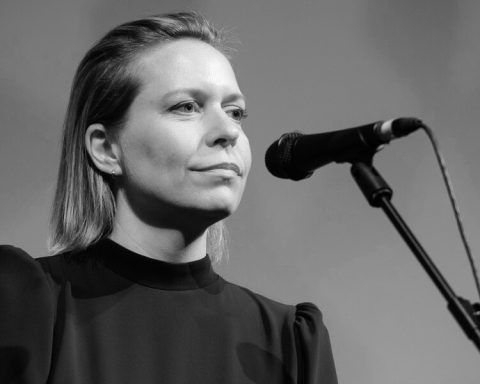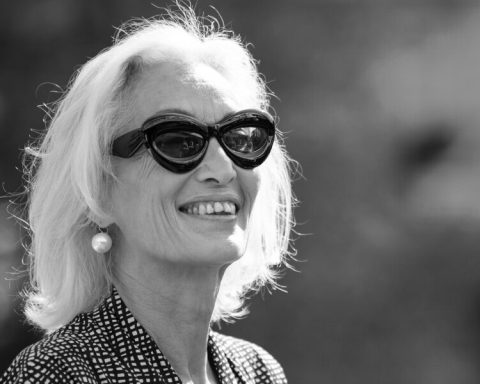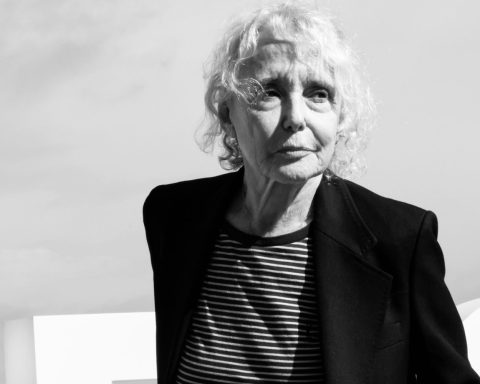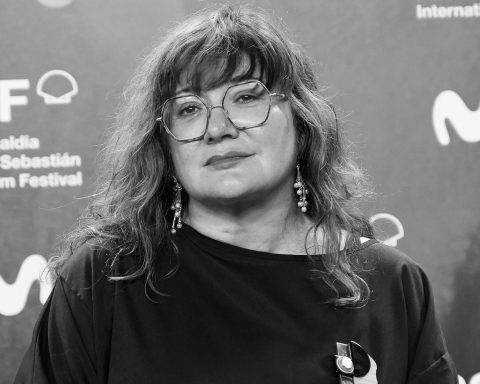The Karlovy Vary International Film Festival absolutely adores Patricia Clarkson and she loves the festival back! The spa town festival honored Clarkson with its Lifetime Achievement Award in 2019 and she was back at KVIFF as a member of the Crystal Globe Competition. One could venture and say the adoration is definitely mutual!
Clarkson’s great grandmother, a Lithuanian young lady, left her home country in 1913 for New York, where she met a Spanish young man (Clarkson’s great grandfather). Together, they set up life in New York and later moved to New Orleans, where Clarkson was eventually born and raised. Clarkson says her mother is on the Lithuanian Council in New Orleans, “And she finally went to Vilnius and raised the flag in honor of her grandmother. It brings tears to my eyes. It meant everything to my mother, her mother, her grandmother… I wish I had known Sophie. She was my mother’s everything. She took my mother to the theater, the ballet, the symphony every weekend of her life and it gave my mother her love of the arts. And she loved her grandmother… I would like to go to Lithuania someday. It’s something I think about.”
She adds: “I’ve talked about being Lithuanian, but I’m a lot of other things. My father is British, Scottish and Welsh and my mother is Spanish, Lithuanian, Irish and German.”
In that sense, her ancestry is of the utmost importance to Clarkson and something she holds very dear, “I think it’s a very American way. We honor the people that made us. I’m not just American. I am all of these beautiful countries. My great grandparents were dead. I never met them. But I did know my grandmother who was Lithuanian and Spanish and I knew her well. She married a German Irishman. And my father is British and Welsh. My middle name is Davies…I think it’s also part of who I am as an actor as I think it gives me all of the colors I need. If I were just solely one lineage, I don’t think I would be who I am… My nose is Spanish, my great grandfather had this nose. My body is my grandmother’s. My skin is very British. And I kind of look British, but I’m not,” she says.
Over the course of her long and eclectic career in the film industry, Clarkson has worked in my countries, with many different directors and has attended a great many film festivals – experiences she deems have made her a better person, “I’ve now worked across the board, even just recently with this beautiful film I have here; I worked with Andrea Pallaoro, and even though this film takes place in Ohio, he’s very much an Italian man and an Italian director… I worked with Marie Schrader on She Said… I’ve been to so many festivals in my life. It’s made me a better person and a better actor to meet people from all around the world and to watch films and now being on this Jury,” she concedes.
Does she ever get lost in translation?
Not really. Clarkson loves being right in the middle of a good old melting pot, “I look at my fellow jurors and one is Slovenian who studied in the Czech Republic, then Dora [Bouchoucha] who’s from Tunisia, then there’s Barry [Ward] who’s Irish. I worked with a lot of Irish actors. I’ve got to work with the great Brandan Gleeson. He’s amazing. It was one of the highlights of my career, working with Brandan Gleeson on State of the Union…I love working across all oceans,” she admits.
Clarkson’s rise to the acting firmament was simultaneous with the rise of independent cinema. She was thirty-eight years old when she was cast in High Art, where she played a “German lesbian heroin addict” – a big contrast to her usual turns as suburban mothers, “No one could imagine me being a German lesbian heroin addict. And sadly, I’m not German or lesbian nor have I ever smoked pot, but at least Cholodenko believed that I could do this. And it literally changed my whole career by playing that,” she reminisces.
Then came, among many others, The Station Agent, HBO’s Six Feet Under and Pieces of April, which she went to the Oscars with, “I went to the Oscars for Pieces of April, a movie we shot for $500,000 on video, and it wasn’t even that good a video quality. But Peter Hedges was writing these great parts for women. The Station Agent was like this. I didn’t know Tom McCarthy wrote this great part for me. He knew Peter Dinklage, and he knew Bobby Cannavale, but he wrote the damn part for me. I didn’t know him, and he wrote the part for me. But you could make that film still today and it’d be great. You could make Pieces of April today and [it would] still be funny and fabulous. So, they were writing great things back then. But it was independent,” she shares.
Even though she occasionally forgets all the films she’s ever been in, she does however remember how and when the industry changed, “I think there are more female-driven films now. Definitely. I mean, that has radically changed. My very first movie was The Untouchables. It was 1985. Even my makeup artist was a man. There were no women on the set. My mother came to visit me and she was like, “Patty, this is kind of fun. You’re the only girl here!’ I was like, ‘Yeah!’ Now, we are telling many more female-driven stories. And we are still lacking women behind the camera and directors. But many crews are female-driven now. And people of color have taken a massive leap forward. Still a long way to go. But Hollywood was literally owned and run by white men. And they were everywhere. We just were part of it. We were just girls on a set. That was it,” she recalls.
She adds: “High Art was directed by a lesbian woman. The whole set, it was all women. And I walked on that set and there were a lot of gay women; they weren’t working in Hollywood as DPs and hair and makeup artists. So, it was just so beautiful to be on a set with this very broad range of women – young, old, gay, straight, non-binary… I was like, ‘Oh, this is the world. This is the world Hollywood needs to be.’ So, High Art was pivotal. It was the biggest change in my career. And I noticed we were changing. The world was changing because that film got made.”
Indeed, Clarkson says she is a testament to how much Hollywood has changed, “I have a lot to say. And I have a lot of power on a set now. I have a lot of women around me. My makeup artist is a woman. I just worked with the best female producer I’ve ever worked with, Allyn Stewart. She produced Sully. I just did this movie about Lilly Ledbetter directed by a wonderful, wonderful female director, [Rachel Feldman]. So, there are so many women involved in my career now and I’m thankful because many of them had to rise through very difficult times. It was very hard for women in the 80s. Very. Very. In the 70s, it was better. But somehow in the 70s, the 80s, the 90s, women were really struggling. It was very male-dominated, and very sexist, and very misogynistic. And we suffered. But we’re back!” she rejoices.
She is grateful for that shift in the attitude towards women and for how it has ushered a new era, “We were always in our panties. We were always the object. We were always the love interest, the girlfriend, the wife. We never had jobs. We’ve never accomplished anything. We just looked really good. I’m not against that. I’m playing a certain character, I want to look good, but there is a strength to letting us be these formidable complicated characters. And we get to do that now,” she says.
Speaking of formidable, complicated characters, Clarkson says that the role that irreversibly changed her both as an actor and a human being was that of Eugenia in Monica by Andrea Pallaoro, “doing Monica was very difficult for me, to play a truly dying woman with no words. I’m a very verbal person. I’m a very physical person and Monica robbed me of those tools. And Andrea Pallaoro shoots in that portrait style and what’s left out is as important as what’s in and it changed me as an actress. It was so radically different for me… But I really love Trace Lysette and to see a transgender actress really rise is stunning. And to have someone of her quality, of her talent, her beauty, rise in cinema was important to me. And it did change me to really get to know the transgender community. It was really a very big moment in my life,” she recounts.
Speaking of women in film, Clarkson also collaborated three times with Spanish director Isabel Coixet, especially on Learning to Drive, a film that boasted an all-female crew that included the illustrious Oscar-winning editor Thelma Schoonmaker, rarely ever lent to any other director by Martin Scorsese, “I love Elegies and then she directed me in Learning to Drive. I loved the essay it’s based on. I love that coming to life and getting to work with Sir Ben Kingsley. I’d been naked with him in Elegies, so I knew him. What a way to start! That was the first scene – naked with Sir Ben Kingsley! Woohoo!” she laughs, remembering those days. “Isabel, of course, is just a flawless director and she’s just liquid and female, very female and very brilliant. I think just outside of cinema, she’s one of the most intelligent, brilliant women I have ever met in my life. And I don’t say that lightly. She’s a brilliant woman. You can talk to her about anything in the world. Any book. Any poem. She’s just formidable. So, I’m a lucky girl that she’s my life,” she says, gushing over Coixet.
Even though she doesn’t always play feminists in her projects, but rather “suburban ladies” as she likes to put it, Clarkson most definitely is a feminist, “My mother ran the city of New Orleans, under two mayors. My mother was a powerhouse. Still is. She’s 88 now. I have four older sisters who are really powerful women. All have big jobs. My oldest sister is retired now. I grew up in a house of six women and two female dogs. So, I grew up in this just naturally feminist house. We didn’t even have to talk about it. We ran the world. I never questioned where I was. I never questioned that I had to succumb to the boundaries of society. I mean, I’m a straight Southern woman who never married and never had children. Are you kidding me? People should’ve come after me in the middle of the night and dragged me away. But I knew at a young age that I didn’t want that, that I loved acting. I loved being in the arts. I loved my freedom. I’m a very solitary person. I’ve had extraordinary men in my life – not all of them, but a few that were truly extraordinary,” she reveals.
Clarkson says she couldn’t have played all the characters she has played over the course of her prolific career unless she’s had love, loss and regrets, “I have regrets, of course. But I knew that I could never be the mother that my mother was. It wasn’t in my body and soul. It wasn’t in my DNA. I was a very free little girl. I just knew who I was at a very early age. And that never went away. And it’s aided me in leaving a very protected house, even though it’s New Orleans, so it’s cool and fun and amazing. It’s not the South, it’s New Orleans. It’s also European in its own way. But I had to leave and go to New York at nineteen, alone. But I knew who I was. And I think that’s kept me strong of surviving Hollywood, because I’ve had hits,” she says.
The hits and “hard times in Hollywood” she speaks of were hits, courtesy of Harvey Weinstein, “I was never sexually abused by Harvey. But I had some tough times with him because he was really difficult. Very difficult. I don’t tell this story often and I tell it now because the story about him is out… There was such catastrophic abuse. Women were suffering. I had Pieces of April and The Station Agent out in the same year, and he was obsessing that I was in supporting on The Station Agent. But Bingham Ray, my mentor and just this man I worship that I done High Art with, was putting me in supporting on Pieces of April. I was the leading lady of The Station Agent. But he used to always do these kind of stupid things of taking someone in a leading part and putting them into supporting. I said, ‘That’s dishonest, Harvey!’ But he took me down. He took me to task. He was brutal to me about not going in supporting. I said ‘No, I’m already in supporting. Bingham has already started an Oscar campaign. I’m going in supporting. You can put me in leading.’ But I’m one of seven in the history of the SAG Awards. I got nominated for Best Actress, Best Supporting and Best Ensemble. And I was like, ‘Na-na-na-na-na!’. I had a couple of years in Hollywood that I couldn’t get the right job. I couldn’t get an artistic job. I couldn’t get the jobs I wanted. And then, it all changed,” she shares.
She adds: “And now, I have too many jobs. And I say that seriously. I’m sixty-three years old. I might take a nap right now! But now, I have more jobs than I know what to do with!”
One of those is an adaptation of Eugene O’Neill’s Long Day’s Journey into Night opposite Brian Cox, with actors Daryl McCormack and Alex Lawther playing her sons, but she is taking life one step at a time now, “I’m gonna take my life where I can take it. But isn’t it great?” she asks.
Photo credits: KVIFF.
This interview was conducted during the 2023 Karlovy Vary International Film Festival – prior to the SAG-AFTRA strike.










